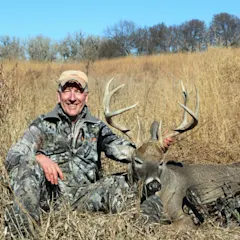Tuttle Creek Wildlife AreaLocation: northeast KansasSize: 12,000 acresZIP: 66411
Think of nearby Tuttle Creek as Milford’s tougher little brother. Offering a similar combination of hardwoods, native prairie, and wheat, milo and soybean fields around a man-made reservoir, Tuttle Creek’s more rugged terrain and slightly higher elevations offset its smaller size. Toss in 60,000 acres of Walk-in Hunting Access (private land leased for public hunting by the Kansas Department of Wildlife and Parks) in four adjacent counties, and you’ve got a whitetail wonderland. A steeper watershed makes Tuttle Creek prone to flooding during fall rains, producing isolated islands among cattail sloughs where big bucks hide. “We haven’t seen any 200-class deer in a couple of years,” says Silovsky, “but they’re here.”
Marais des Cygnes Wildlife AreaLocation: southeast KansasSize: 7,600 acresZIP: 66075
The floodplain of the winding Marais des Cygnes River features some of the most extensive timber stands in this predominantly prairie state. Bottomland and upland woods mix with wetlands and cropfields. Southeastern Kansas receives twice as much rain as the western third of the state, and the steep bluffs and lush cover combined with an extensive refuge closed to hunting offer bucks lots of sanctuaries. However, the action heats up once the big boys start roaming beyond their home ranges for the rut.


